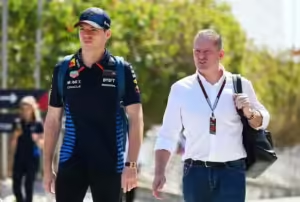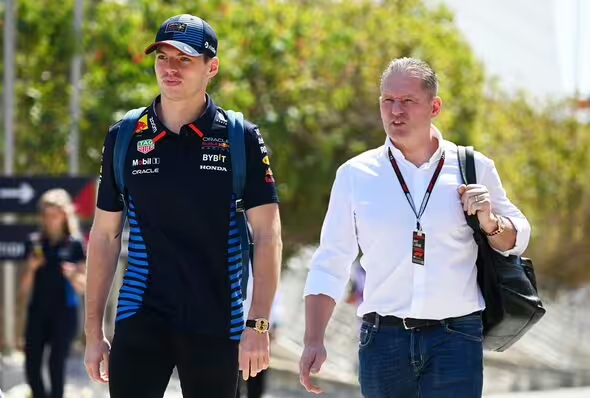The Parenting Philosophy of Jos Verstappen: Toughening Up Max Verstappen for Life in the Fast Lane
Formula 1 has always been a sport characterized by extreme pressure, remarkable talent, and an unwavering drive for victory. Athletes in this arena are not only expected to master the physical demands of racing but also display intense mental resilience. Max Verstappen, the Dutch racing prodigy and two-time World Champion, embodies this balance of skill and fortitude. Behind his ascent to the pinnacle of motorsport lies a controversial yet compelling parenting philosophy employed by his father, Jos Verstappen, who sought to toughen up his son in the high-stakes world of racing.

Early Influences: Jos Verstappen’s Journey in Motorsport
Jos Verstappen is a name that resonates with motorsport enthusiasts, having raced in Formula 1 for several teams between 1994 and 2003. Although he never secured a podium finish in F1, his career spanned a variety of racing disciplines, including sports cars and endurance racing. With his own robust experience in the competitive motorsport landscape, Jos understood the demands and pressures that come with the profession. He witnessed firsthand the physical and psychological challenges that athletes face, and he made it his mission to prepare Max for these hurdles.
From a tender age, it was clear that Max had a natural affinity for racing. He began karting at just four years old, displaying skills that captivated those around him. Coordinating his transition into higher levels of motorsport, Jos adopted a no-nonsense approach shaped by his own experiences. He was determined not just to cultivate Max’s driving skills, but also to instill resilience and toughness.
A Difficult Lesson: The Car Exhaust Incident
Among the many stories circulating about the Verstappen household, one particularly vivid incident stands out: Jos reportedly toughening Max up by encouraging him to place his fingers on a car’s exhaust. This act can be viewed through various lenses, but it underscores Jos’s philosophy of resilience and self-discipline.
In racing, drivers are often tested both physically and mentally. The sport demands a level of grit that can only be developed through hard experiences. By having Max interact with a hot exhaust, Jos aimed to teach his son about pain, endurance, and the harsh realities of motorsport. It was about more than just the physical act of touching something hot; it was a means of instilling a mindset that would push Max beyond what he believed to be possible.
While such actions might raise eyebrows in a modern parenting context, they reflect the tough-love approach that Jos believes is necessary for survival in a sport where only the strongest thrive. The racing world is unforgiving, and aspiring athletes must learn to handle pressure, setbacks, and even physical pain to succeed.
The Impact on Max Verstappen’s Career
As Max transitioned through the ranks—moving from karting to Formula 3 before finally establishing himself in Formula 1—the lessons imparted by his father became evident. Verstappen exhibited an uncanny ability to withstand pressure during races, and his performance on-track has often been described as aggressive yet calculated.
In 2015, at just 17 years old, Max became the youngest driver to compete in Formula 1, a testament to his early development and the tough mindset instilled by Jos. His meteoric rise through the ranks was characterized not only by a prodigious talent behind the wheel but also by an unyielding tenacity that has seen him face unfair criticism and incredible expectations head-on.
The emotional toll of motorsport cannot be understated. Verstappen has faced intense scrutiny from fans, pundits, and the media alike, yet he consistently manages to maintain his focus and drive to perform. Jos’s controversial techniques have undeniably played a role in shaping the athlete Max has become today—a driver known for his fierce competitiveness and fearlessness on the circuit.
The Debate Around Tough Parenting
The incident with the exhaust has reignited discussions around the ethics of tough parenting. While proponents argue that it builds character and resilience—qualities essential for success in high-pressure environments—critics point out the potential risks, both physical and psychological.
Modern parenting often emphasizes the importance of emotional support and well-being, and many would argue that such methods can border on abuse rather than discipline. There is a delicate balance between preparing children for the realities of life and subjecting them to unnecessary pain or trauma.
In Max’s case, his success lends credence to Jos’s philosophy. The results speak volumes, but it raises the question: could Max have achieved the same level of success without such harsh methods?
The Legacy of Jos and Max Verstappen
As Max Verstappen continues to break records and collect titles, the narrative surrounding his upbringing remains a focal point in discussions about performance, ethics, and parenting philosophies in elite sports. The results achieved by both father and son offer insights into the complex relationship between parenting style and success in high-pressure environments.
Jos Verstappen’s influence is apparent in Max’s driving style and character. While the method of toughening him up may be subject to debate, there’s no denying that the lessons learned through those early trials have prepared him for a life in one of the most demanding sports in the world.
As Max builds his legacy, both on and off the track, it will be essential to consider the broader implications of Ras’s parenting style against the backdrop of evolving societal norms regarding discipline and emotional health. Whether one agrees with Jos Verstappen’s methods or not, they undeniably played a role in crafting one of the most exciting talents in motorsport today.
Max Verstappen’s story is a captivating tale of ambition, talent, and the unique parenting philosophy that shaped him. His father’s stringent, often controversial methods in the name of toughness raise important questions about how we nurture the next generation of athletes. As Verstappen continues to carve his name in the annals of Formula 1 history, the lessons learned through pain and resilience serve not only as a foundation for his achievements but also as a focal point for future discussions around parenting, pressure, and personal development in the world of sports.
